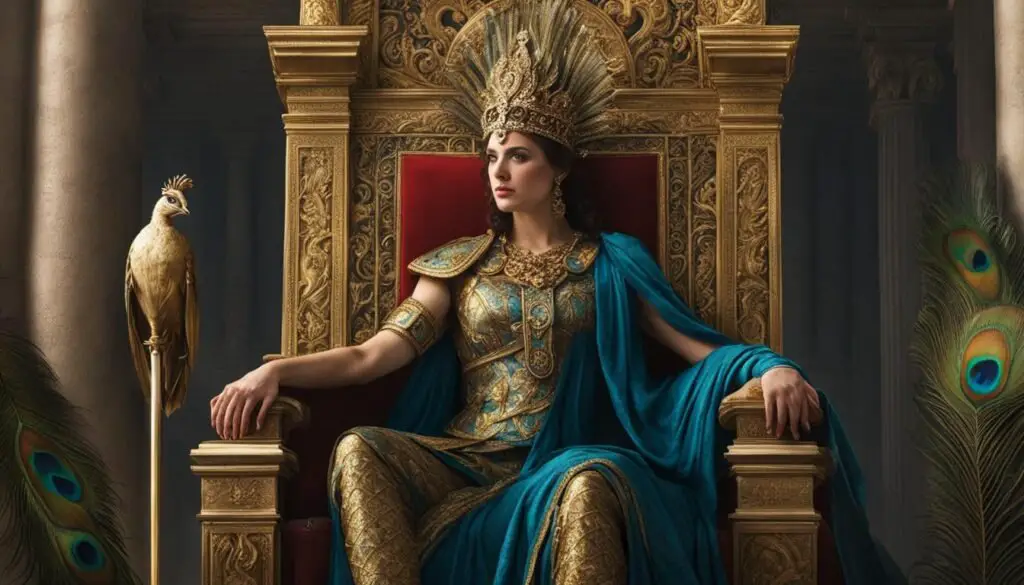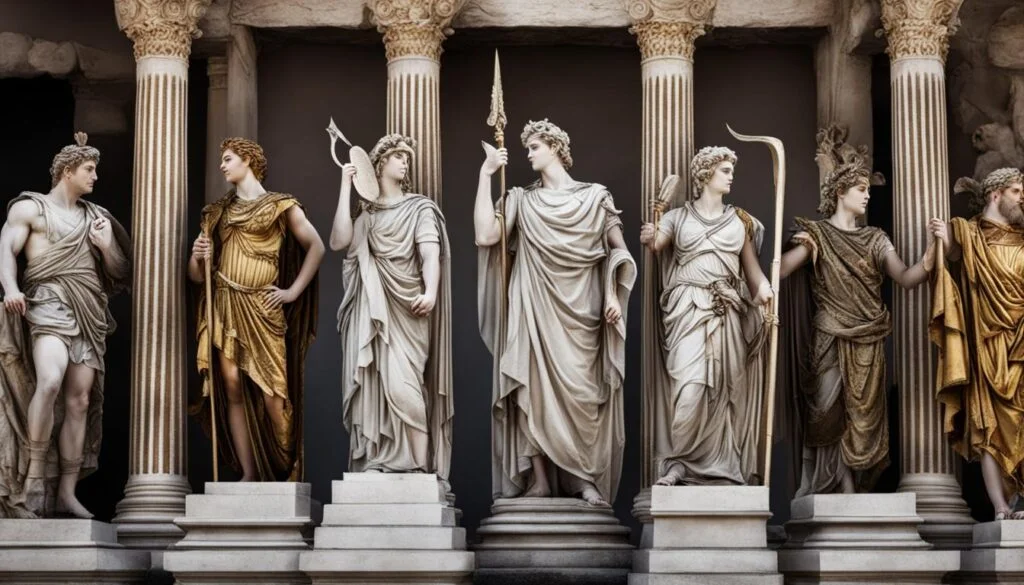Juno, also known as Juno Regina, was an ancient Roman goddess who held a significant role in Roman mythology.
She was the queen of the gods and the protector of the state. Juno was associated with marriage, childbirth, and family, and she played a vital role in the lives of women in ancient Rome.
She was the sister and wife of Jupiter, the king of the gods, and the mother of numerous deities, including Mars, Vulcan, and Juventas.
Juno was equated with Hera in Greek mythology, and she was often depicted wearing a goatskin cloak, armed, and with a peacock by her side.
Key Takeaways:
- Juno was the queen of the gods in Roman mythology.
- She was associated with marriage, childbirth, and family.
- Juno was the sister and wife of Jupiter, the king of the gods.
- She was equated with Hera in Greek mythology.
- Juno was often depicted with a peacock by her side.
Discover more about Juno’s fascinating origins and her symbolism in Roman culture in the following sections.
The Origins and Mythology of Juno
Juno, the ancient Roman goddess, has a rich and fascinating mythology that spans across Roman religion and society. She held various roles and was deeply intertwined with the lives of the people. Let’s explore the origins and mythology of Juno to get a deeper understanding of this influential deity.
One of the uncertainties surrounding Juno is the origin of her name. It is believed to derive from the Latin term “iunior,” which means young, as she was associated with the new moon. Juno’s mythology reflects her multifaceted nature and her significance in Roman culture. She was considered the guardian of married women, protector of the family, and the goddess of childbirth.
Juno’s relationship with Jupiter, her brother and husband, is a significant aspect of her mythology. It symbolizes loyalty and commitment in marriage, highlighting the ideals of harmony and love necessary for a successful union. An intriguing story involving Juno is her jealousy towards Jupiter’s affairs, particularly his relationship with Io. This jealousy resulted in the transformation of Io into a cow and the introduction of the peacock as Juno’s sacred animal.
As we delve deeper into the mythology of Juno, we discover the symbolism and representations associated with her. The peacock stands out as one of her most prominent symbols, representing immortality, eternal life, and lasting love. Juno was often depicted in regal attire, emphasizing her status as the queen of the gods. Other symbols connected to Juno include the pomegranate, symbolizing unity and fertility, and the veil worn by brides, symbolizing purity and modesty.
In conclusion, Juno’s origins and mythology reveal her significant role in ancient Roman culture. She represented the ideals of marriage, family, and fertility, providing guidance and protection to women and families. Juno’s complex relationship with Jupiter, along with her symbolism and representations, continue to captivate and inspire, reflecting the enduring importance of love, unity, and the sacred bonds of family.
The Symbolism and Representations of Juno

Juno, the queen of the gods in Roman mythology, held great significance in Roman culture. She was associated with various symbols and representations that encompassed her roles as a deity of marriage and fertility.
The Peacock
One of the most prominent symbols associated with Juno is the peacock. In Roman culture, the peacock represented immortality, eternal life, and lasting love. Its vibrant colors also symbolized fertility and abundance, aligning with Juno’s association with fruitful relationships.
The Pomegranate
Another symbol associated with Juno is the pomegranate. This fruit symbolized unity and fertility, emphasizing the importance of strong and fruitful marriages. The pomegranate represented the unity of two individuals and the potential for growth and prosperity in their relationship.
The Bridal Veil
In Roman weddings, brides would wear a veil that was believed to have been inspired by Juno. The veil symbolized purity and modesty, reflecting Juno’s role as the guardian of marriage and the protector of the family. It represented the sanctity of the marital union and the commitment between spouses.
Juno’s representations in art and literature often showcased her regal nature as the queen of the gods. She was depicted wearing robes and jewelry, emphasizing her status and power. These visual representations further reinforced Juno’s importance in Roman culture and her role as the goddess of marriage, family, and childbirth.
- The peacock symbolized immortality, eternal life, and lasting love.
- The pomegranate represented unity and fertility.
- The bridal veil symbolized purity and modesty.
Juno’s symbolism and representations continue to captivate audiences, reflecting the enduring importance of love, unity, and the sacred bonds of family in Roman culture.
Juno and the Roman Pantheon

Within the Roman pantheon, Juno held a prominent position as one of the major deities. She was an integral part of the Capitoline Triad, along with Jupiter and Minerva, and was worshipped as the guardian of Rome. Juno’s role extended beyond marriage and family; she was also associated with political and military functions. Her various epithets, such as Juno Regina and Juno Moneta, reflected her multifaceted nature and the diverse aspects of her personality.
Juno was considered a matron goddess, overseeing the well-being of married women and the protection of the household. She provided blessings and guidance to families, resolving issues and fostering unity. Her divine presence brought stability and strength to family life, nurturing the bonds within the home. Juno’s significance in Roman society was further emphasized by the numerous temples dedicated to her in Rome and other cities throughout the Roman Empire.
As a matron goddess, Juno played a vital role in the lives of women, providing guidance and blessings during childbirth and advocating for women’s rights. She ensured the harmony and well-being of families, watching over them and resolving conflicts. Juno’s association with motherhood extended to her role as a fertility deity, with women seeking her aid in conceiving and bearing children. Her influence as the protector of married women and the guardian of the household extended beyond mythology, influencing Roman society and traditions.
Juno as Matron Goddess in Roman Culture:
- Overseeing the well-being of married women
- Providing blessings and guidance to families
- Advocating for women’s rights
- Ensuring harmony and well-being of families
- Symbolizing the importance of motherhood and fertility
Temples and Worship:
- Numerous temples dedicated to Juno in Rome and other cities
- Juno worshipped as the guardian of Rome
- Her divine presence sought by merchants, traders, and those seeking financial success
Juno’s Consort: Jupiter

Juno and Jupiter had a complex and intriguing relationship within Roman mythology. They were both siblings and married, serving as the king and queen of the gods. Despite Jupiter’s infidelity, Juno remained devoted to him, demonstrating her resilience and grace in the face of challenges. Their celestial bond symbolized loyalty, respect, and love. Juno’s role as Jupiter’s wife emphasized her role as the guardian of marriages, both among mortals and immortals.
Their relationship highlighted the enduring nature of love and the lessons of forgiveness and loyalty that can be applied to mortal unions. Despite Jupiter’s many affairs, Juno’s commitment to their marriage remained steadfast. This enduring love and devotion made Juno an icon of loyalty and dedication, serving as a role model for couples in both ancient times and the present day.
The Bond of Juno and Jupiter
- Complex relationship as siblings and spouses
- Symbolized loyalty, respect, and love
- Juno’s commitment despite Jupiter’s infidelity
- Lessons of forgiveness and loyalty
Juno’s role as Jupiter’s wife emphasized her position as the queen of the gods. Their partnership represented the harmony and balance necessary for a successful union, reflecting the idealized vision of marriage in Roman society. Despite the challenges they faced, Juno and Jupiter’s celestial bond remained unbroken, serving as a testament to the enduring power of love and commitment.
Throughout Roman mythology, Juno’s role as the queen of the gods showcased her power and influence. Despite Jupiter’s status as the king, Juno held her own authority and was respected by both gods and mortals alike. Juno’s position as the consort of Jupiter elevated her status and demonstrated her importance in the Roman pantheon.
Juno as a Matron Goddess

Juno, the ancient Roman goddess, held a significant role in Roman culture as a matron deity. She was revered as the guardian of married women and the protector of the household, ensuring the harmony and well-being of families. Juno’s divine presence brought stability and strength to family life, nurturing the bonds within the home. Women sought her guidance and blessings during childbirth, and she was seen as an advocate for the rights and welfare of women.
Juno’s association with motherhood extended to her role as a fertility deity. Women turned to her for aid in conceiving and bearing children, seeking her divine intervention and support. She was a symbol of hope and fertility, offering solace during the challenging journey of motherhood.
Significance in Roman Culture:
- Juno was considered the queen of the gods and played a vital role in the lives of women in ancient Rome.
- She ensured the well-being of married women and protected the household, fostering harmony and resolving conflicts.
- Juno was revered for her association with fertility and motherhood, providing guidance and blessings to those seeking to conceive and bear children.
- As a matron goddess, Juno represented the strength and unity of families, symbolizing the enduring bonds of marriage and the sacredness of family life.
Through her symbolism and representations, Juno continues to captivate audiences, reflecting the enduring importance of love, unity, and the sacred bonds of family in Roman culture.
Juno in Roman Society and Celebrations

Juno, the powerful queen of the gods in Roman mythology, held a significant role in Roman society and traditions. Her influence went beyond the realm of mythology, permeating various aspects of Roman life.
One of the ways Juno was celebrated in Roman culture was through the Matronalia, a festival held on the first of March. This festival honored Juno as the protector of married women. During the Matronalia, wives would ask their husbands for money as a symbolic gesture, which would then be offered to Juno in her temple. This celebration reinforced the importance of marriage and the well-being of women in Roman society.
In addition to celebrating Juno through festivals, she also had multiple temples dedicated to her in Rome and other cities across the Roman Empire. These temples served as places of worship where people sought Juno’s guidance and protection. Merchants, traders, and those seeking financial success often turned to Juno, recognizing her influence in matters of prosperity and abundance.
Through these celebrations and religious practices, Juno’s presence in Roman society was firmly established. Her association with marriage, family, and the well-being of women made her an integral part of Roman culture. Juno’s importance underscored the value placed on unity, love, and the sacred bonds of family in ancient Rome.
Conclusion
Juno, the mighty queen of the gods in Roman mythology, held a powerful role as the guardian of marriage, family, and childbirth. She was a symbol of loyalty, commitment, and protection. Juno’s significance extended beyond mythology, influencing Roman society and traditions.
Her association with marriage and fertility, along with her divine presence, brought harmony and strength to families. Juno’s complex relationship with Jupiter showcased the endurance of love and the lessons of forgiveness and loyalty. As a matron goddess, Juno advocated for the rights of women and guided them through the journey of motherhood.
Juno’s symbolism and representations continue to captivate audiences, reflecting the enduring importance of love, unity, and the sacred bonds of family.
FAQ
Who was Juno in Roman mythology?
Juno, also known as Juno Regina, was the queen of the gods and the protector of the state in ancient Roman mythology. She was associated with marriage, childbirth, and family, and played a vital role in the lives of women in ancient Rome.
What were Juno’s symbols and representations?
Juno was often associated with symbols such as the peacock, which represented immortality and lasting love. Other symbols included the pomegranate, representing unity and fertility, and the veil worn by brides during wedding ceremonies, symbolizing purity and modesty.
What was Juno’s role in Roman society?
Juno held a prominent position as one of the major deities within the Roman pantheon. She was considered the guardian of Rome, overseeing the well-being of married women, and protecting the household. Juno’s influence extended beyond marriage and family; she was also associated with political and military functions.
What was Juno’s relationship with Jupiter?
Juno and Jupiter were both siblings and married, serving as the king and queen of the gods. Despite Jupiter’s infidelity, Juno remained devoted to him, symbolizing loyalty and commitment in marriage.
How did Juno influence Roman society and traditions?
Juno’s importance was celebrated with various rituals and festivals, such as the Matronalia, which honored her as the protector of married women. Juno had several temples dedicated to her in Rome and other cities throughout the Roman Empire, and her divine guidance and protection were sought by merchants, traders, and those seeking financial success.




